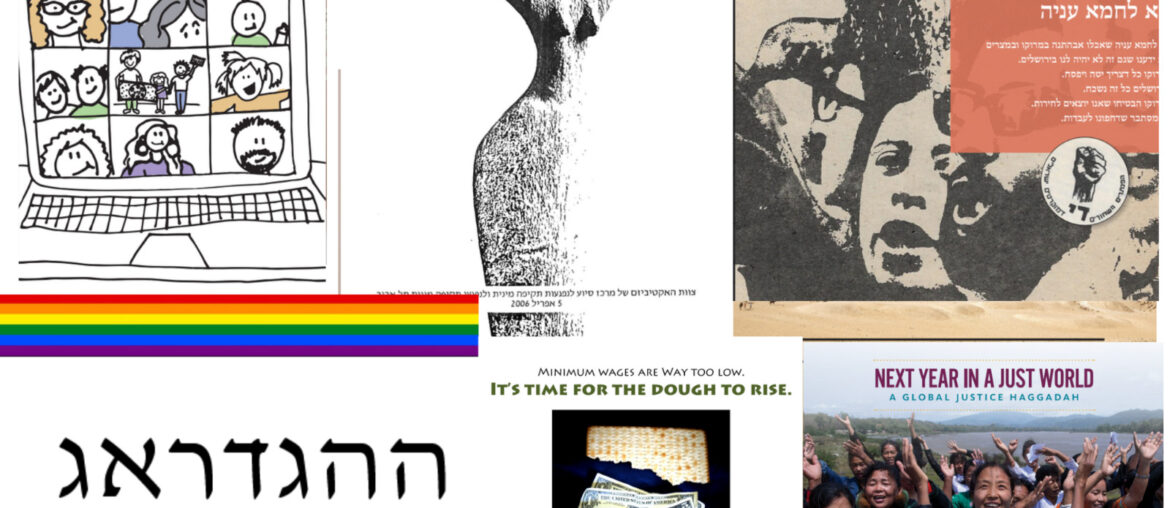‘In every generation, each person is obligated to see themselves as if they had left Egypt.’
As Jews we have always inserted our personal and communal stories into the seder night experience.
In April 1946, The Survivors’ Haggadah incorporated elements of the traditional Passover text with the recent experiences of Holocaust survivors. During Passover 1969, The Freedom Seder included new readings that connected the Jewish exodus from Egypt with the struggle for Civil Rights.
The Ezrachion, a radical social movement in Israel dedicated to creating an activist archive collection, has collected digital copies of dozens of social justice Haggadot in English and Hebrew.
Why is this year different from other years?
In a recent episode of the Chochmat Nashim podcast, ‘Connecting the Dots for Freedom,’ Dr. Tanya White says that this year, as the Jewish people inhabit this ‘liminal’ point in Jewish history, finding our individual connection to the story of Pesach is even more important.
‘Seder night, more than anything, is the night of belonging. What does it mean to belong to the Jewish people? One of the images I think of on seder night is to connect the dots of Jewish history to feel a sense of belonging.’
This year, the Hostages and Missing Families Forum has created the Haggadah of Freedom, a seder guide including personal stories from Israeli hostages and their families, intertwining these contemporary stories of captivity with the traditional Passover blessings.
Rachel Goldberg-Polin, whose son Hersh (z”l) was kidnapped and killed by Hamas, captured the urgency of this moment in a recent podcast interview with Dan Senor.
‘We have an obligation this year to really beat ourselves up at the Seder, because the whole point of Passover is a commemoration of leaving the worst form of bondage and slavery. How can we do that this year when we know that 59 people are still there, 24 of whom are alive, alive and in the worst, most horrific bondage? The question is: why are they still there?’
This is not a year to skip the hard questions. The Haggadah demands that we ask, reflect, and tell the story anew—in our own generation, in our own voice.
Women Connecting the Dots of Jewish History
For many Jewish women, this year’s seder takes place at the intersection of historical memory and present pain.
Over the decades, seder tables have expanded to include the stories of women long excluded from the Exodus narrative.
We remember the midwives, the mothers, the sisters—and the modern-day women whose leadership, grief, and resilience shape our people’s journey today.
This year, we need to ‘connect the dots for freedom’ more than ever.
Feminist Haggadah Additions
We have collected some feminist additions to the Haggadah—texts and rituals that help us ask new questions, hear different voices, and create deeper meaning. They highlight the roles of Shifra, Puah and Miriam in the Passover story, offer an alternative Four Questions and include Four Daughters, which honors a historical or contemporary Jewish woman for each cup of wine
They’re not replacements, but reminders that every generation has its Egypt and must pursue freedom.
- The Wandering is Over Haggadah (JWA)
In 2011, the Jewish Women’s Archive (JWA) created The Wandering is Over Haggadah, an open-source, fully inclusive digital resource that integrates women’s voices throughout the seder. As JWA noted, ‘In the 1970s and 1980s, people began to recognize the role of women in the Passover story and in contemporary Jewish life and incorporate their stories into the Passover seder. We wanted to continue that tradition by including women’s voices and newer rituals like Miriam’s Cup into The Wandering is Over Haggadah to create the first downloadable, open-source Haggadah that celebrates Jewish women.’
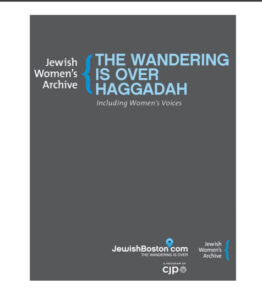
Download The Wandering is Over Haggadah
- Na’amat’s Feminist Haggadah
This year, Na’amat, the Israeli women’s movement, has created a Haggadah supplement based on the commandment to ‘tell your daughter on that day.’ This edition brings the women of the Exodus into focus—including figures such as Miriam, Pharaoh’s daughter, and the midwives Shifrah and Puah.
As the organisation explains, ‘This offers a female perspective to the classic Haggadah that is passed down from generation to generation, interweaving the stories of the women who took part in the story of the Exodus from Egypt—after all, ‘Thanks to righteous women we were redeemed from Egypt.”’ (The Babylonian Talmud, Sotah)
The supplement also features a reinterpretation of the Four Children as Four Daughters, each representing a different voice and question regarding Jewish womanhood today.
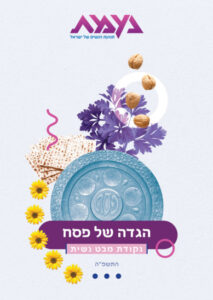
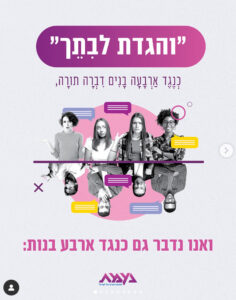
Translation: ‘And you shall tell your daughter. The Torah speaks of four sons, and we will speak of four daughters as well.’ (From the Na’amat Instagram page advertising their Haggadah)
Download Na’amat Digital Haggadah
- NCJW Feminist Supplement: The Five Women of the Exodus
The National Council of Jewish Women America (NCJW) has created a Feminist Supplement to the traditional Haggadah that honors five women from the Exodus: Shifra, Puah, Yocheved, Batya, and Miriam. These women’s courageous actions and leadership are often overlooked in the traditional narrative, yet their roles were crucial in bringing about the liberation of the Jewish people. This supplement is designed to be used during the four cups of wine, placing these women’s stories at the heart of the Seder.
The supplement also reinterprets the Four Children, offering feminist counterparts and questions that resonate with modern struggles for justice and equality. By engaging with these questions, we acknowledge that the fight for freedom and equality is ongoing.
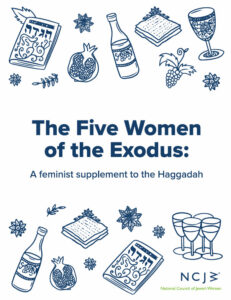
Download NCJW Feminist Supplement
Wishing you and your loved ones a Chag Sameach. We hope that these resources will help us individually and collectively ‘Connect the Dots for Freedom.’

